Related Research Articles

The Gaza Strip, or simply Gaza, is a polity and the smaller of the two Palestinian territories. On the eastern coast of the Mediterranean Sea, Gaza is bordered by Egypt on the southwest and Israel on the east and north.
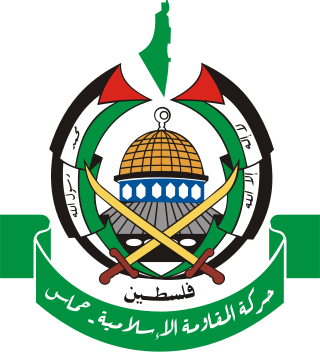
Hamas, an acronym of its official name, Harakat al-Muqawama al-Islamiya, is a Palestinian Sunni Islamist political and military movement governing the Israeli-occupied Gaza Strip since 2007.

The Israeli–Palestinian conflict is an ongoing military and political conflict about land and self-determination within the territory of the former Mandatory Palestine. Key aspects of the conflict include the Israeli occupation of the West Bank and Gaza Strip, the status of Jerusalem, Israeli settlements, borders, security, water rights, the permit regime, Palestinian freedom of movement, and the Palestinian right of return.
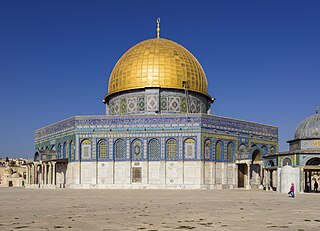
The history of the State of Palestine describes the creation and evolution of the State of Palestine in the West Bank and Gaza Strip. During the Mandatory period, numerous plans of partition of Palestine were proposed but without the agreement of all parties. In 1947, the United Nations Partition Plan for Palestine was voted for. The leaders of the Jewish Agency for Palestine accepted parts of the plan, while Arab leaders refused it. This triggered the 1947–1949 Palestine war and led, in 1948, to the establishment of the state of Israel on a part of Mandate Palestine as the Mandate came to an end.

The Palestinian territories are the two regions of the former British Mandate for Palestine that have been occupied by Israel since the Six-Day War of 1967, namely the West Bank and the Gaza Strip. The International Court of Justice (ICJ) has referred to the West Bank, including East Jerusalem, as "the Occupied Palestinian Territory", and this term was used as the legal definition by the ICJ in its advisory opinion of July 2004. The term occupied Palestinian territory was used by the United Nations and other international organizations between October 1999 and December 2012 to refer to areas controlled by the Palestinian National Authority, but from 2012, when Palestine was admitted as one of its non-member observer states, the United Nations started using exclusively the name State of Palestine. The European Union (EU) also uses the term "occupied Palestinian territory". The government of Israel and its supporters use the label "disputed territories" instead.

Palestine, officially the State of Palestine, is a country in the southern Levant region of West Asia. It encompasses two disconnected territories — the West Bank and the Gaza Strip, collectively known as the Palestinian territories — within the larger region of Palestine. The country shares its borders with Israel to north, west and south, Jordan to the east and Egypt to the southwest. It has a combined land area of 6,020 square kilometres (2,320 sq mi) while its population exceeds five million people. Its proclaimed capital is Jerusalem while Ramallah serves as its administrative center and Rafah is currently its largest city. Arabic is the official language. The majority of Palestinians practice Islam while Christianity also has a significant presence.

Media coverage of the Israeli–Palestinian conflict has been said, by both sides and independent observers, to be biased. This coverage includes news, academic discussion, film, and social media. These perceptions of bias, possibly exacerbated by the hostile media effect, have generated more complaints of partisan reporting than any other news topic and have led to a proliferation of media watchdog groups.

The history of the Israeli–Palestinian conflict traces back to the late 19th century when Zionists sought to establish a homeland for the Jewish people in Ottoman-controlled Palestine, a region roughly corresponding to the Land of Israel in Jewish tradition. The Balfour Declaration of 1917, issued by the British government, endorsed the idea of a Jewish homeland in Palestine, which led to an influx of Jewish immigrants to the region. Following World War II and the Holocaust, international pressure mounted for the establishment of a Jewish state in Palestine, leading to the creation of Israel in 1948.
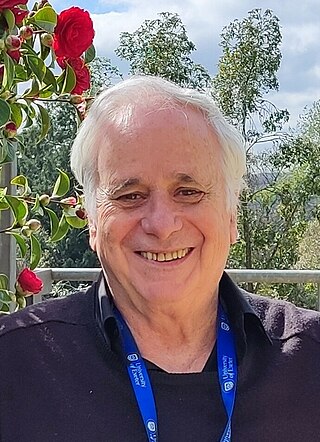
Ilan Pappé is an Israeli historian, political scientist, and former politician. He is a professor with the College of Social Sciences and International Studies at the University of Exeter in the United Kingdom, director of the university's European Centre for Palestine Studies, and co-director of the Exeter Centre for Ethno-Political Studies. Pappé was also a board member of the Israeli political party Hadash, and was a candidate on the party list in the 1996 and 1999 Israeli legislative elections.

The Arab–Israeli conflict is the phenomenon involving political tension, military conflicts, and other disputes between various Arab countries and Israel, which escalated during the 20th century. The roots of the Arab–Israeli conflict have been attributed to the support by Arab League member countries for the Palestinians, a fellow League member, in the ongoing Israeli–Palestinian conflict; this in turn has been attributed to the simultaneous rise of Zionism and Arab nationalism towards the end of the 19th century, though the two national movements had not clashed until the 1920s.

Leila Farsakh is a Palestinian political economist who was born in Jordan and is a Professor of Political Science at University of Massachusetts Boston. Her area of expertise is Middle East Politics, Comparative Politics, and the Politics of the Arab-Israeli Conflict. Farsakh holds a MPhil from the University of Cambridge, UK (1990) and a PhD from the University of London (2003).
Kathleen (McGrath) Christison is an American political analyst and author whose primary area of focus is the Israeli–Palestinian conflict.

Norman Gary Finkelstein is an American political scientist and activist. His primary fields of research are the politics of the Holocaust and the Israeli–Palestinian conflict.

Anna Baltzer is an American public speaker, author and activist for Palestinian human rights.

The economy of the Gaza Strip was dependent on small industries and agriculture. After years of decline, the Gaza economy experienced some growth in the late 2000s, boosted by foreign aid. According to the International Monetary Fund, the economy grew 20 percent in 2011, and the per capita gross domestic product increased by 19 percent.
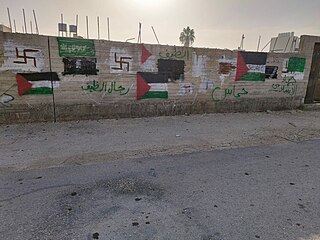
Racism in the Palestinian territories encompasses all forms and manifestations of racism experienced in the Palestinian Territories, of the West Bank, Gaza, and East Jerusalem, irrespective of the religion, colour, creed, or ethnic origin of the perpetrator and victim, or their citizenship, residency, or visitor status. It may refer to Jewish settler attitudes regarding Palestinians as well as Palestinian attitudes to Jews and the settlement enterprise undertaken in their name.

The two-state solution to the Israeli–Palestinian conflict proposes to resolve the conflict by establishing two nation states in former Mandatory Palestine. The implementation of a two-state solution would involve the establishment of an independent State of Palestine alongside the State of Israel.
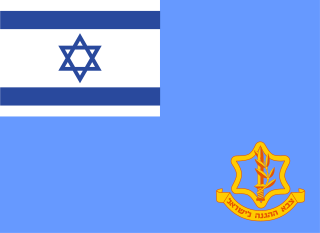
The Israeli Military Governorate was a military governance system established following the Six-Day War in June 1967, in order to govern the civilian population of the West Bank, the Gaza Strip, the Sinai Peninsula and the western part of Golan Heights. The governance was based on the Fourth Geneva Convention, which provides guidelines for military rule in occupied areas. East Jerusalem was the only exception from this order, and it was added to Jerusalem municipal area as early as 1967, and extending Israeli law to the area effectively annexing it in 1980. During this period, the UN and many sources referred to the military governed areas as Occupied Arab Territories.
The Palestinians' right to resist is a contentious issue deeply rooted in the ongoing conflict between Israel and Palestine, particularly in relation to the Israeli occupation of Palestinian territories. This right, recognized under international law, is based on the principle of self-determination for all peoples under foreign and colonial rule.
In May 2017 Palestinian political and military organization Hamas unveiled A Document of General Principles and Policies, also referred to as the new or revised Hamas charter. It advocated for a Palestinian state in the 1967 borders, describing this as a "formula of national consensus", but at the same time strove for the "complete liberation of Palestine, from the river to the sea", and did not explicitly recognize Israel. The new charter holds that armed resistance against an occupying power is justified under international law.
References
- 1 2 3 4 5 "Faculty Bio: Sara Roy". Harvard Center for Middle Eastern Studies. Retrieved 2018-06-03.
- ↑ Lawrence, Bruce B. (2007). "Roy: Failing Peace: Gaza and the Palestinian-Israeli Conflict (review)". Journal of Palestine Studies . 37 (1): 111. doi:10.1525/jps.2007.37.1.111. Archived from the original on 13 February 2012.
- ↑ Adam Shatz (2004). Prophets Outcast: A Century of Dissident Jewish Writing About Zionism and Israel. Nation Books. ISBN 978-1-56025-509-3.
- ↑ Roy, Sara (2018-01-03). "Gaza A Reflection". Prophetic Voices on Middle East Peace (PDF). Vol. 1. Claremont Press. p. 21. doi:10.2307/j.ctvbcd292.6. ISBN 9780692774854. JSTOR j.ctvbcd292.6.
- ↑ Sara Roy. "Living with the Holocaust: The Journey of a Child of Holocaust Survivors". Institute for Palestine Studies. Retrieved 2022-01-03.
- ↑ Roy, Sara (2019-06-04). "On Equating BDS With Anti-Semitism: a Letter to the Members of the German Government". CounterPunch.org. Retrieved 2022-01-03.
- ↑ Sara Roy, 'A Letter to Biden on Gaza' Counterpunch 21 May 2021
- ↑ Roy, Sara (Fall 2002). "Living with the Holocaust: The Journey of a Child of Holocaust Survivors". Journal of Palestine Studies . 32 (125). Institute for Palestine Studies: 5–12. doi:10.1525/jps.2002.32.1.5. Archived from the original on 2011-06-14., reprinted in Shatz, Adam (2004). Prophets Outcast: a Century of Dissident Jewish Writing About Zionism and Israel. NationBooks. pp. 343–356. ISBN 978-1-56025-509-3.
- ↑ Roy, Sara (October 2008). "The Impossible Union of Arab and Jew: Reflections on Dissent, Remembrance and Redemption" (PDF). Edward Said Memorial Lecture. University of Adelaide. Retrieved 2018-05-28.
- ↑ "Sara Roy, From Oslo to the Road Map". Committee for a Just Peace in Israel and Palestine. March 2004. Archived from the original on 2012-02-08.
- ↑ Campbell, John C. (Summer 1986). "Foreign Affairs Book Review: Conflicts and Contradictions. Meron Benvenisti. New York: Villard Books/Random House, 1986". Foreign Affairs.
- ↑ Roy, Sara M.; Project, West Bank Data Base (1986). The Gaza Strip: a demographic, economic, social and legal survey. West Bank Data Base Project. ISBN 9789653100046.
- ↑ Roy, S.M., 1989. Development under occupation: a study of United States government economic development assistance to the Palestinian people in the West Bank and Gaza Strip, 1975-1985.
- ↑ Hamas and Civil Society in Gaza: Engaging the Islamist Social Sector by Sara Roy. Princeton University Press website. 8 May 2011. ISBN 9780691124483 . Retrieved 2018-06-03.
- ↑ Schnitzer, J.J.; Roy, S.M. (June 1994). "Health services in Gaza under the autonomy plan". Lancet. 343 (8913): 1614–7. doi:10.1016/S0140-6736(94)93063-5. PMID 7911926. S2CID 206008125.
- ↑ Roy, Sara (March 1, 2012). "Gaza: Treading on Shards". The Nation. Retrieved 2018-06-03.
- ↑ "Edward Said Memorial Lecture: Doctor Sara Roy's Biography". The University of Adelaide: Edward Said Memorial Lecture. 2008-10-11. Retrieved 2018-05-28.
- ↑ "Baylor University || Center For Jewish Studies". 2007-02-14. Archived from the original on 2010-01-10.
- ↑ "Steve Garden, The Lumière Reader".
- ↑ Belfast Film Festival (2017), Belfastfilmfestival.org. Accessed December 14, 2022.
- ↑ Allen, Brittany. "Please welcome the 2024-25 class of Cullman fellows". Literary Hub. Retrieved 24 April 2024.
- ↑ Roy, Sara. "Hamas: Politics, Charity and Terrorism in the Service of Jihad | Middle East Policy Council". Middle East Policy Council . Retrieved 2018-05-28.
- ↑ "Book Reviews". Middle East Policy. 14 (2): 149–174. June 2007. doi:10.1111/j.1475-4967.2007.00306.x. ISSN 1061-1924.